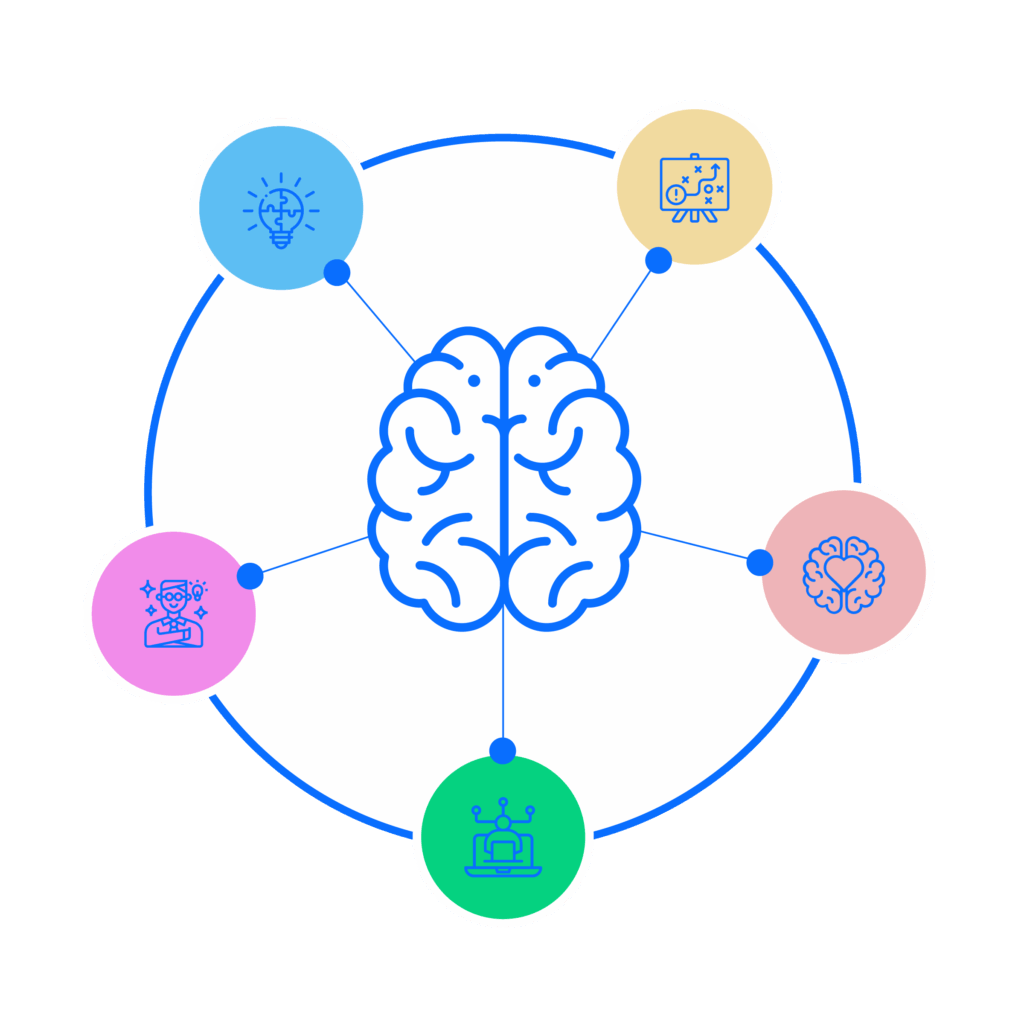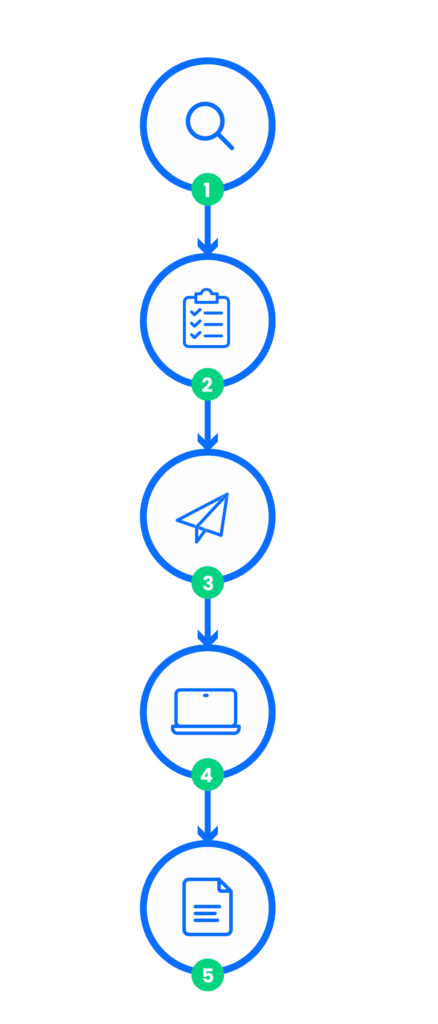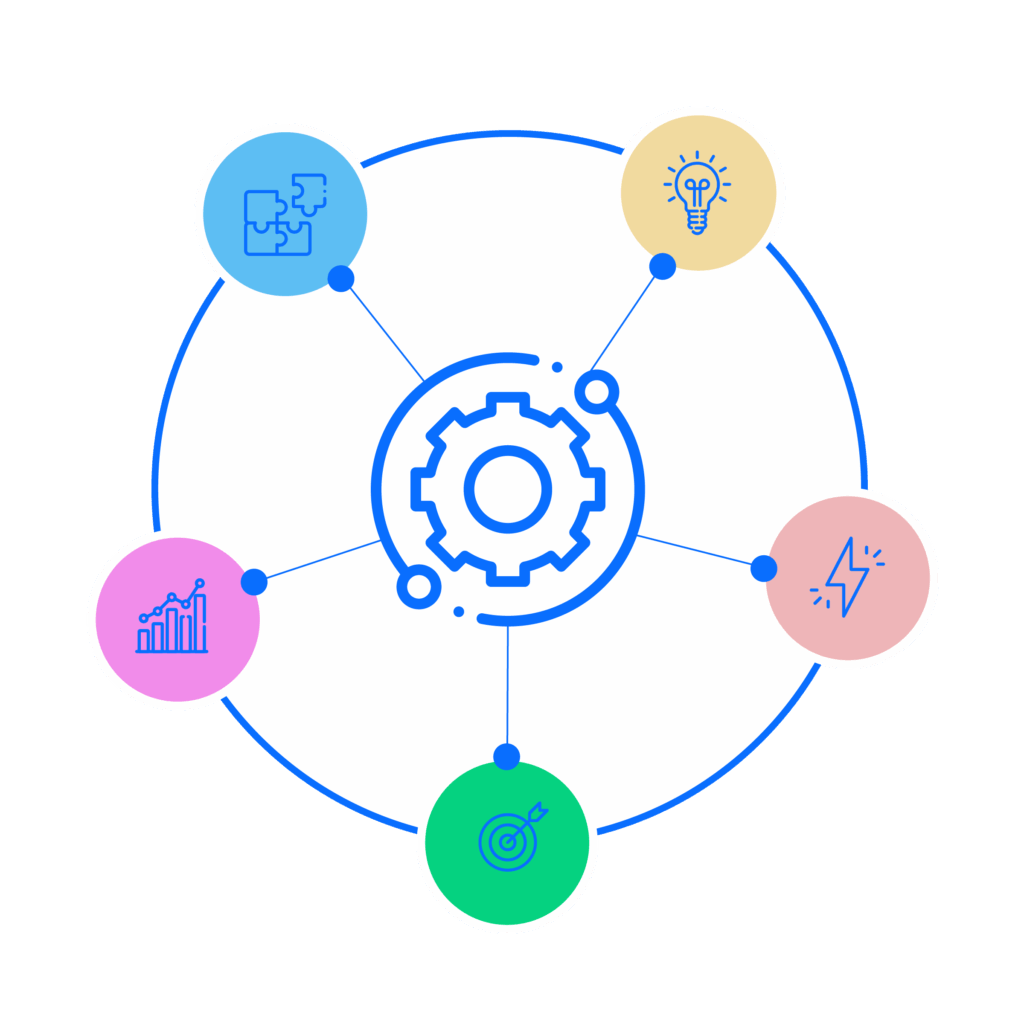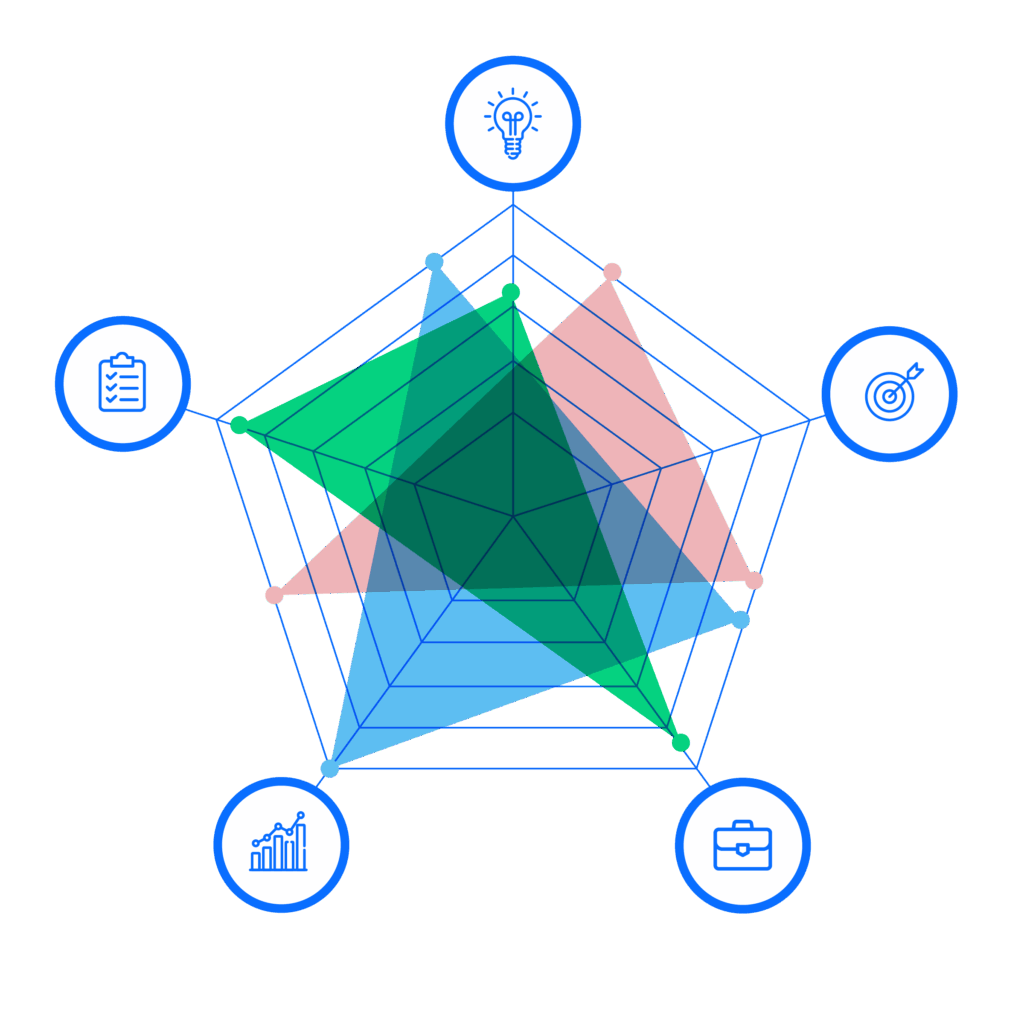Pruebas Psicométricas Clave | Contrata el talento adecuado
¿Estás buscando una forma más efectiva de elegir al mejor talento desde el inicio del proceso de selección? Las pruebas psicométricas laborales te permiten tomar decisiones más acertadas al evaluar de manera objetiva habilidades, aptitudes e incluso rasgos de personalidad de los candidatos.
El proceso de selección de un nuevo integrante normalmente involucra recursos antes y durante la selección que significan una alta inversión de tiempo y esfuerzo. Las empresas que buscan procesos eficientes y contrataciones adecuadas se están enfocando en incorporar herramientas completas que facilitan el reclutamiento.
Las principales herramientas son plataformas de pruebas psicométricas que ofrecen un perfil y análisis completo de los candidatos.
A diferencia de una entrevista tradicional, un examen psicométrico bien aplicado puede revelar aspectos clave del comportamiento laboral, el estilo de pensamiento y el ajuste cultural de cada postulante. Así, no solo reduces el margen de error al contratar, sino que encuentras personas que realmente encajan con tu empresa.
Las pruebas psicométricas no son un recurso nuevo, es una herramienta que surgió en París en 1870 con el profesor Alfred Binet quien las utilizaba para identificar a los alumnos más inteligentes. Sin embargo, el campo y la forma de aplicación de estas pruebas ha evolucionado significativamente y con ello su efectividad en los procesos de reclutamiento.
Evalart pone estas herramientas al alcance de tu equipo de reclutamiento con una plataforma intuitiva, segura y confiable, adaptada a las necesidades del mercado latinoamericano. Con nuestras pruebas psicométricas en línea, puedes automatizar parte del proceso de evaluación sin perder profundidad en el análisis.
En este artículo te explicamos todo lo que necesitas saber sobre las pruebas psicométricas, los distintos tipos de pruebas que existen y para qué sirve cada uno.
Empieza hoy mismo con una prueba gratuita o explora nuestro catálogo completo de exámenes psicométricos diseñados por expertos en evaluación laboral.
¿Qué es una prueba psicométrica?
Una prueba psicométrica es una herramienta estandarizada que permite evaluar características individuales de un candidato como su inteligencia, razonamiento, habilidades cognitivas, personalidad, y más.
En el contexto laboral, se utilizan para predecir el desempeño profesional, identificar el nivel de compatibilidad con un rol específico y facilitar la toma de decisiones en procesos de selección.
Estas pruebas, que pueden incluir desde un test de personalidad hasta un simulador de examen psicométrico técnico. Se aplican en distintas etapas del reclutamiento para filtrar perfiles y entender mejor el potencial real de cada persona más allá de su currículum.
Una evaluación psicométrica laboral se basa en criterios objetivos y medibles, lo cual la convierte en una herramienta valiosa para reclutadores y gerentes de recursos humanos que buscan precisión, rapidez y un proceso más justo.
Exámenes psicométricos ¿Qué incluyen?
Los exámenes psicométricos son instrumentos diseñados para medir de forma estandarizada y objetiva distintos aspectos del comportamiento humano. En el ámbito laboral, estos exámenes se utilizan para evaluar si un candidato posee las características necesarias para desempeñar exitosamente un rol determinado.
Existen distintos tipos de exámenes, cada uno enfocado en medir áreas específicas como:
- Capacidades cognitivas: razonamiento verbal, numérico, abstracto, memoria de trabajo.
- Rasgos de personalidad: nivel de responsabilidad, estabilidad emocional, adaptabilidad.
- Aptitudes técnicas: conocimientos específicos del puesto, como programación o contabilidad.
- Compatibilidad cultural: valores, motivaciones y estilo de trabajo del candidato.
Aplicar estos exámenes permite reducir la subjetividad en el proceso de contratación, aumentando la probabilidad de seleccionar a la persona adecuada para el puesto y el equipo.
Evalart ofrece una amplia variedad de exámenes psicométricos laborales preconfigurados y personalizables según las necesidades de tu empresa. (Catalogue link or button here)
Objetivos de las pruebas psicométricas
Las pruebas psicométricas laborales tienen un propósito claro: ofrecer datos objetivos y comparables que faciliten la toma de decisiones en los procesos de selección.
En lugar de depender únicamente de entrevistas o currículums, estas pruebas aportan una capa adicional de análisis que mejora la calidad de las contrataciones.
Principales objetivos de los exámenes psicométricos:
- Identificar el potencial real de un candidato. No basta con saber si alguien tiene experiencia: ¿tiene la capacidad de aprender, adaptarse y resolver problemas? ¿Podrá adaptarse fácilmente a la cultura de la empresa y al trabajo en equipo?
- Reducir sesgos en la contratación. Las pruebas estandarizadas permiten comparar a todos los candidatos con las mismas condiciones.
- Predecir el desempeño futuro. Estudios muestran que ciertas aptitudes y rasgos son altamente predictivos del éxito en el trabajo.
- Agilizar el proceso de selección. Con una sola evaluación puedes filtrar hasta un 80% de postulantes y enfocarte solo en los más aptos.
- Mejorar el encaje cultural. Una buena contratación no solo cumple con las funciones del puesto, sino que también se integra al equipo y cultura empresarial.
Un buen manager de contratación utiliza las pruebas psicométricas para:
- Evaluar soft skills y hard skills con mayor precisión antes de la entrevista.
- Ahorrar tiempo en procesos con alto volumen de postulaciones.
- Establecer un criterio de evaluación unificado entre varios entrevistadores.
- Tener mayor confianza en la decisión final, respaldada por datos concretos.
- Reducir la rotación de personal, al asegurar una mejor compatibilidad con el puesto y el entorno laboral.
¿Qué miden las pruebas psicométricas?
Las pruebas psicométricas laborales están diseñadas para evaluar una combinación de habilidades, aptitudes, conocimientos y rasgos de personalidad que influyen directamente en el desempeño de un candidato en el entorno laboral.
Estas evaluaciones permiten ir más allá de la experiencia o el título profesional y enfocarse en lo que realmente importa: cómo piensa, reacciona y se desempeña una persona en situaciones reales de trabajo.
Ámbitos que evalúan los test psicométricos:
- Aptitudes cognitivas: razonamiento lógico, atención, memoria, análisis verbal y numérico.
- Capacidad de resolución de problemas: rapidez, precisión y pensamiento crítico frente a situaciones nuevas.
- Rasgos de personalidad: estabilidad emocional, responsabilidad, apertura al cambio, liderazgo, entre otros.
- Inteligencia emocional: habilidades para trabajar en equipo, manejar el estrés o adaptarse a entornos cambiantes.
- Conocimientos técnicos: según el rol, pueden integrarse evaluaciones prácticas en programación, ventas, atención al cliente, etc.
¿Cómo aplicar los test psicométricos de manera efectiva?
Una evaluación psicométrica sólo es útil si se aplica correctamente. Para que los resultados sean realmente valiosos y te ayuden a contratar mejor, es fundamental integrar los test al proceso de selección de manera estratégica.
Buenas prácticas para aplicar exámenes psicométricos:
1.Define el perfil del puesto: Antes de aplicar cualquier prueba, asegúrate de tener claridad sobre los requisitos del rol. (Descripción de puesto)
2.Elige el tipo de prueba adecuado: Usa test de aptitudes, personalidad o técnicos según las habilidades clave que quieras medir. Estas son unas de las pruebas principales que se utilizan en los procesos efectivos de reclutamiento. (Catalogue link)
Test de Liderazgo: Este tipo de prueba evalúa la capacidad de una persona para influir, tomar decisiones estratégicas, comunicarse efectivamente y gestionar equipos.
¿Qué mide?
– Estilos de liderazgo (autoritario, participativo, delegativo, etc.)
– Habilidades de toma de decisiones
– Capacidad para gestionar conflictos y motivar a otros
¿Para quién se recomienda? Ideal para puestos de jefatura, coordinación, gerencia o cualquier rol donde se requiera liderazgo directo sobre un equipo.
Puedes explorar las pruebas de liderazgo disponible en Evalart.
Test DISC: La Prueba DISC es una de las evaluaciones psicométricas más utilizadas para entender el comportamiento de los candidatos en contextos profesionales. Evalúa cuatro dimensiones clave de la conducta: Dominancia, Influencia, Estabilidad (Constancia) y Cumplimiento, proporcionando una visión clara del estilo de comunicación y respuesta ante distintas situaciones laborales.
¿Qué mide?
– Reacciones bajo presión
– Estilo de comunicación y motivación
– Compatibilidad con distintos entornos y equipos de trabajo
¿Para quién se recomienda?
Es especialmente útil para puestos administrativos, comerciales, de atención al cliente y mandos medios, donde la interacción con otros, la colaboración y la adaptabilidad son factores determinantes para el éxito.
Conócelo mejor en la Prueba DISC Completa de Evalart.
Test de Inteligencia (IQ) Completo: Evalúa el potencial cognitivo integral
La prueba de inteligencia de Evalart está diseñada para medir diferentes dimensiones del razonamiento, proporcionando una estimación confiable del coeficiente intelectual (CI). A través de ejercicios que abarcan razonamiento lógico, numérico, verbal y espacial, esta evaluación ofrece una perspectiva clara del potencial cognitivo de los candidatos.
¿Qué mide?
– Agilidad mental y razonamiento abstracto
– Capacidad de resolución de problemas
– Comprensión verbal y análisis numérico
¿Para quién se recomienda?
Ideal para puestos analíticos o técnicos como desarrolladores de software, analistas de datos, ingenieros y cargos administrativos de alto nivel, donde la toma de decisiones y el pensamiento crítico son fundamentales.
Descubre más sobre el Test de Inteligencia (IQ) Completo de Evalart.
3.Integra la prueba al proceso de selección desde el inicio: No esperes a la etapa final para evaluar al candidato. Usar pruebas al inicio permite filtrar desde el primer contacto y ahorrar tiempo.
4.Automatiza el proceso: Utiliza plataformas como Evalart para enviar pruebas, monitorear respuestas y obtener resultados automáticamente.
5.Interpreta los resultados con criterio: Las pruebas psicométricas no deben tomarse como una verdad absoluta, sino como un insumo adicional para tomar decisiones informadas.

Cómo elegir la prueba psicométrica adecuada para cada perfil
Seleccionar la prueba psicométrica correcta no solo depende del tipo de puesto, sino también del momento del proceso, la estrategia de reclutamiento y los indicadores que realmente impactan el rendimiento a largo plazo. Aquí te damos un enfoque más profundo para tomar mejores decisiones:
1. Define qué necesitas predecir
No todas las pruebas están diseñadas para predecir el desempeño. Por ejemplo:
- Tests de inteligencia como el Test de Inteligencia (IQ) Completo son excelentes predictores del aprendizaje rápido y la capacidad de adaptación. Permiten anticipar qué tan rápido un nuevo colaborador puede absorber conocimientos, resolver problemas y asumir nuevas responsabilidades.
- Tests de personalidad como el Big Five o el DISC ayudan a predecir aspectos como la compatibilidad con la cultura organizacional, el estilo de liderazgo, o la forma en que una persona enfrenta retos y trabaja en equipo.
- Pruebas situacionales o de juicio permiten evaluar comportamientos en escenarios clave.
🔎 Elige la prueba en función de la métrica de éxito que quieres anticipar: ¿Productividad? ¿Adaptabilidad? ¿Permanencia?
2. Integra con tus datos históricos de contratación
Si ya tienes información sobre qué características han definido a tus mejores empleados, úsala como referencia. Por ejemplo:
- Si tus mejores vendedores tienen puntuaciones altas en extraversión y resiliencia, prioriza tests que miden esas dimensiones.
- Evalart te permite comparar resultados de candidatos actuales con promedios anteriores para afinar tu filtro.
3. Adapta la dificultad al mercado laboral
En contextos donde hay escasez de talento, aplicar pruebas demasiado exigentes al principio puede ahuyentar a buenos candidatos. Ajusta el nivel y tipo de pruebas según:
- La competitividad del puesto
- La urgencia de contratación
- La etapa del proceso (por ejemplo, una prueba ligera como primer filtro y una más robusta en la etapa final)
4. Evita sesgos con combinaciones inteligentes
Una sola prueba puede favorecer ciertos perfiles o estilos cognitivos. Para evitar sesgos:
- Combina pruebas objetivas (como de aptitud) con subjetivas (como de personalidad)
- Alterna entre formatos: opción múltiple, respuesta abierta, preguntas por video, etc.
5. Evalúa la experiencia del candidato
El test también comunica algo sobre tu marca empleadora. Asegúrate de que:
- Sea claro y amigable en su formato
- Tenga una duración razonable
- Brinde retroalimentación clara – Evalart ofrece informes automáticos y personalizables
Ventajas de las pruebas psicométricas
Las pruebas psicométricas laborales ofrecen múltiples beneficios para las empresas que buscan optimizar su proceso de reclutamiento y contratar al talento ideal desde el inicio.
¿Por qué deberías usar test psicométricos en tu empresa?
Decisiones basadas en datos, no en suposiciones: Evaluar objetivamente las habilidades, aptitudes y rasgos de personalidad permite tomar decisiones fundamentadas y reducir el riesgo de contratar por intuición.
Procesos de selección más eficientes: Al filtrar automáticamente a los candidatos que no cumplen con el perfil, se reduce hasta un 80% el número de entrevistas necesarias.
Mejor ajuste candidato-puesto: Al conocer el perfil conductual y cognitivo del postulante, se puede evaluar si realmente encaja con el rol y la cultura de la empresa.
Aumento de la productividad y disminución de la rotación: Contratar al perfil correcto desde el inicio reduce el tiempo de adaptación, mejora el desempeño y minimiza el riesgo de abandono temprano.
Experiencia de reclutamiento más profesional y transparente: Contar con pruebas estructuradas da una mejor impresión a los candidatos y estandariza la evaluación.
Desventajas de las pruebas psicométricas
Aunque las pruebas psicométricas laborales ofrecen grandes beneficios, es importante considerar también sus posibles limitaciones para aplicarlas de manera consciente y estratégica.
Aspectos a tener en cuenta
- No deben ser el único criterio de selección: Una evaluación psicométrica efectiva complementa el proceso de selección, pero no reemplaza entrevistas, referencias o la revisión del historial laboral.
- Mal uso o interpretación de resultados: Si no se cuenta con personal capacitado o herramientas con reportes claros, existe el riesgo de interpretar incorrectamente los resultados y tomar decisiones erróneas. (Features or How it works link)
- Rechazo por parte de los candidatos: Algunos postulantes pueden sentirse incómodos o desmotivados si las pruebas no están bien explicadas o parecen poco relevantes para el puesto.
- Riesgo de pruebas poco confiables: Usar tests sin validación científica puede perjudicar más de lo que ayuda. Es importante elegir plataformas que cuenten con respaldo profesional y técnico.
- Tiempo y recursos mal invertidos: Cuando no se tiene claridad sobre qué se quiere medir o cómo se integrará esta información en el proceso de contratación, las pruebas pueden volverse una pérdida de tiempo.
Cómo utilizar las pruebas psicométricas para mejorar la contratación
Aplicar exámenes psicométricos laborales de forma estratégica puede transformar tu proceso de reclutamiento y ayudarte a tomar decisiones más objetivas, acertadas y rápidas.
Buenas prácticas para una aplicación efectiva
- Define claramente el perfil del puesto: Antes de elegir un test psicométrico, identifica las habilidades, conocimientos y rasgos de personalidad más relevantes para el rol. Esto permite seleccionar la prueba adecuada y personalizarla si es necesario.
- Utiliza herramientas confiables y especializadas: Asegúrate de aplicar evaluaciones con validez psicométrica comprobada y que estén alineadas con los estándares de la industria.
- Integra las pruebas al proceso de selección desde el inicio: Utiliza los resultados para filtrar candidatos en las primeras etapas y reducir el número de entrevistas, enfocándote solo en quienes realmente cumplen con el perfil.
- Analiza los resultados en conjunto: Evalúa los resultados psicométricos junto con el CV, la entrevista y otras fuentes. Así tendrás una visión más completa de cada candidato.
- Comunica con claridad a los candidatos: Explica por qué se aplica la prueba, cómo se utiliza la información y qué esperar del proceso. Esto mejora la experiencia del postulante y aumenta la tasa de finalización del test.
Explora nuestras pruebas listas para aplicar o ponte en contacto con nosotros.

Tipos de pruebas psicométricas laborales
Las pruebas psicométricas no son todas iguales. Dependiendo del perfil del puesto y del objetivo de la evaluación, existen diferentes tipos de exámenes que miden aspectos específicos del candidato.
Desde habilidades cognitivas hasta rasgos de personalidad, cada prueba ofrece una perspectiva distinta sobre el potencial, la adecuación y el desempeño esperado de un profesional.
A continuación, exploramos los principales tipos de evaluaciones psicométricas laborales y cómo pueden ayudarte a tomar decisiones de contratación más acertadas.
Tests psicométricos de aptitudes y habilidades
Estas pruebas están diseñadas para medir la capacidad cognitiva, el razonamiento lógico y la destreza mental de los candidatos. Son fundamentales para identificar si una persona tiene el potencial para aprender, adaptarse y resolver problemas en el entorno laboral.
¿Qué miden este tipo de pruebas?
- Capacidad de razonamiento lógico y abstracto
- Pensamiento analítico
- Resolución de problemas
- Velocidad de procesamiento
- Atención a los detalles
Estas evaluaciones son especialmente útiles para roles que requieren toma de decisiones rápidas, análisis de datos, o capacidad de adaptación a nuevas situaciones.
Ejemplos de pruebas psicométricas de aptitud:
- Test de Inteligencia (IQ) Completo: Evalúa inteligencia general a través de ejercicios de razonamiento verbal, numérico, espacial y lógico. Es útil para identificar el potencial intelectual de los candidatos más allá de su formación académica o experiencia previa.
- Prueba de Razonamiento Lógico V2.0: Mide la capacidad del postulante para detectar patrones, resolver problemas abstractos y pensar de manera estructurada. Es especialmente recomendable para roles técnicos, analíticos y de toma de decisiones.
- Simulador de examen psicométrico: Herramientas digitales que replican las condiciones reales de una prueba de aptitudes para preparar a los candidatos o filtrar con mayor objetividad.
Pruebas psicométricas de personalidad
Las pruebas psicométricas de personalidad evalúan rasgos conductuales y patrones emocionales que influyen en cómo una persona se relaciona con los demás, toma decisiones y se adapta a distintos entornos laborales.
Estas pruebas no buscan determinar si un candidato es “bueno” o “malo”, sino identificar si su estilo de personalidad encaja con el rol específico y con la cultura organizacional.
Este tipo de pruebas son especialmente útiles para posiciones que requieren trabajo en equipo, liderazgo, atención al cliente o toma de decisiones bajo presión. Algunos ejemplos comunes incluyen el test de personalidad, el test de liderazgo, el test DISC y el test de Big 5.
Ventajas de las pruebas de personalidad:
- Permiten conocer cómo se comportará el candidato en distintos escenarios laborales.
- Ayudan a predecir compatibilidad con el equipo y estilo de liderazgo.
- Reducen el riesgo de contrataciones inadecuadas por falta de ajuste cultural.
Evaluaciones psicométricas de inteligencia
Las pruebas psicométricas de inteligencia están diseñadas para medir la capacidad cognitiva general de una persona, incluyendo su habilidad para resolver problemas, aprender rápidamente y adaptarse a nuevas situaciones.
Estas evaluaciones se enfocan en identificar el potencial intelectual del candidato más allá de su experiencia previa o conocimientos técnicos.
Entre las evaluaciones más utilizadas se encuentra el Test de Inteligencia (IQ) Completo, disponible en Evalart, que permite medir de forma integral el coeficiente intelectual de una persona. Esta prueba evalúa distintas dimensiones cognitivas como razonamiento verbal, numérico, espacial y lógico, brindando una visión clara del potencial intelectual del candidato.
Otra prueba destacada es la de Razonamiento Lógico V2.0, ideal para puestos que requieren pensamiento analítico y capacidad para resolver problemas complejos. Esta evaluación mide la habilidad de identificar patrones, seguir secuencias lógicas y tomar decisiones fundamentadas, lo cual resulta fundamental en contextos laborales dinámicos y técnicos.
Este tipo de evaluaciones es útil para roles que requieren:
- Pensamiento crítico y análisis lógico. Ejemplo: Analistas de datos, ingenieros de calidad o investigadores de mercado.
- Resolución de problemas complejos. Ejemplo: Desarrolladores de software, gerentes de operaciones o arquitectos de soluciones.
- Toma de decisiones rápidamente. Ejemplo: Supervisores de planta, personal de atención a clientes o responsables de logística.
- Capacidad para aprender conceptos técnicos o estratégicos. Ejemplo: Trainees en programas de liderazgo, consultores estratégicos o especialistas en IT.
¿Qué miden este tipo de pruebas?
- Razonamiento verbal y numérico
- Pensamiento lógico y abstracto
- Velocidad de procesamiento mental
- Capacidad de aprendizaje
Ventajas de evaluar la inteligencia en procesos de selección:
- Identificación de candidatos con alto potencial de desarrollo
- Mayor objetividad en la toma de decisiones
- Mejora en la predicción del rendimiento laboral
Pruebas psicométricas en línea
Las pruebas psicométricas en línea se han convertido en una herramienta clave para modernizar los procesos de reclutamiento. Permiten evaluar a gran escala, con mayor rapidez y con recursos optimizados.
Además, ofrecen una experiencia cómoda tanto para el candidato como para el equipo de selección.
Evalart ofrece un catálogo de más de 500 evaluaciones que pueden aplicarse de manera 100% digital, incluyendo tests psicométricos de personalidad, aptitud, inteligencia, y conocimiento técnico.
Gracias a su tecnología, puedes automatizar la aplicación, monitorear en tiempo real y recibir resultados inmediatos para tomar decisiones más informadas.
Ventajas de las pruebas psicométricas en línea:
- Escalabilidad: Evalúa a decenas o cientos de candidatos en simultáneo, sin perder precisión.
- Estandarización: Todos los candidatos reciben las mismas condiciones, reduciendo sesgos.
- Agilidad: Resultados automáticos disponibles en cuanto el candidato finaliza el test.
- Seguridad: Herramientas como verificación de identidad y monitoreo con cámara para prevenir fraudes.
- Efectividad: Las pruebas psicométricas en línea ayudan a filtrar de manera efectiva hasta un 80% de las solicitudes.
Test de personalidad
Los test de personalidad son una parte esencial del proceso de evaluación psicométrica, ya que permiten entender cómo un candidato podría comportarse en el entorno laboral. Más allá de las habilidades técnicas o cognitivas, estos exámenes revelan rasgos como la estabilidad emocional, la sociabilidad, la responsabilidad, la apertura al cambio, y la forma en que una persona se relaciona con otros.
Evalart ofrece tests psicométricos de personalidad laborales creados por psicólogos expertos, que ayudan a identificar si un candidato se ajusta a la cultura de la empresa y al estilo de trabajo requerido.
¿Para qué sirven los test de personalidad?
- Evaluar compatibilidad cultural: ¿El candidato podrá no entrar en el equipo actual?
- Identificar fortalezas conductuales: Como liderazgo, adaptabilidad, trabajo en equipo.
- Prevenir conflictos: Al anticipar cómo puede reaccionar una persona en situaciones de presión.
- Tomar decisiones más completas: Al considerar tanto lo técnico como lo humano.
Entre los más utilizados en procesos de selección están:
- Test DISC Completo: Evalúa el estilo conductual del candidato en el entorno laboral a través de cuatro dimensiones: Dominancia, Influencia, Estabilidad y Cumplimiento. Esta prueba es altamente útil para identificar estilos de liderazgo, comunicación y colaboración, facilitando decisiones acertadas sobre integración en equipos o posiciones de supervisión.
- Prueba de los 5 Factores (Big Five):
Esta evaluación mide cinco grandes rasgos de personalidad: apertura a nuevas experiencias, responsabilidad, extroversión, amabilidad y estabilidad emocional. Es ideal para conocer la capacidad de adaptación social, manejo del estrés y compatibilidad cultural del candidato, especialmente en roles con alto nivel de interacción interpersonal como atención al cliente, ventas o recursos humanos.
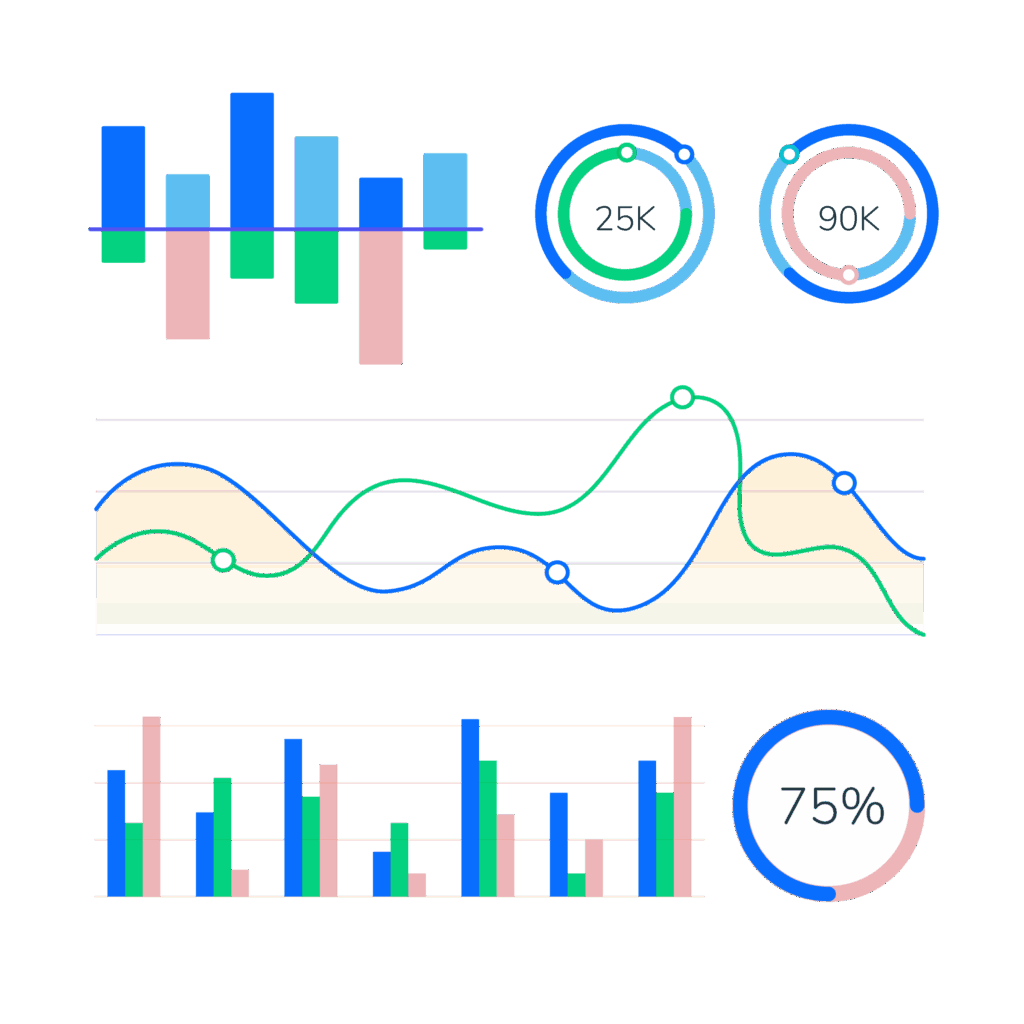
Más allá del reclutamiento: Cómo utilizar las pruebas psicométricas en otras etapas del ciclo laboral
Las pruebas psicométricas no solo sirven para seleccionar talento. También son una herramienta clave para desarrollar y retener a tus empleados. Aquí te mostramos cómo aplicarlas estratégicamente en otros momentos:
1. Desarrollo y formación
Al aplicar tests psicométricos a tu equipo actual, puedes:
- Identificar brechas de habilidades
- Personalizar planes de capacitación
- Detectar oportunidades de mejora en liderazgo, comunicación o resolución de problemas
Ejemplo: Un test de personalidad puede revelar que un colaborador con gran potencial técnico necesita apoyo en habilidades interpersonales para poder liderar un equipo.
2. Planes de sucesión
Evalúa a los empleados con potencial de crecimiento para definir si están listos para asumir mayores responsabilidades. Las pruebas pueden ayudarte a:
- Detectar habilidades de liderazgo
- Medir la capacidad de aprendizaje y adaptación
- Identificar compatibilidad con nuevos retos
3. Clima laboral y cultura organizacional
Al aplicar tests grupales, puedes entender cómo se configura tu equipo:
- ¿Hay equilibrio entre perfiles analíticos y creativos?
- ¿Qué estilos de trabajo predominan?
- ¿Existen áreas de fricción cultural?
Esto te permite tomar decisiones informadas sobre reestructuras, nuevas contrataciones y dinámicas de trabajo.
4. Reevaluación antes de reubicaciones internas
Si estás por cambiar a alguien de área o asignarle un nuevo proyecto, puedes utilizar las pruebas para confirmar que el perfil se adapta al nuevo entorno.
Pruebas psicométricas – Ejemplos
Las pruebas psicométricas se pueden adaptar a distintos perfiles y objetivos de contratación. A continuación, te presentamos ejemplos concretos de cómo se utilizan en procesos reales de selección para evaluar a diferentes tipos de candidatos, con base en las competencias requeridas para el rol.
Ejemplo 1: Evaluación psicométrica para desarrollador de software
- Tipo de pruebas aplicadas:
- Test técnico de programación
- Test de aptitud lógica y razonamiento abstracto
- Test de personalidad laboral
- Qué se mide:La capacidad del candidato para resolver problemas reales mediante código funcional, su pensamiento lógico, velocidad de aprendizaje y estilo de trabajo en equipo.
- Objetivo de la evaluación:Asegurar que el candidato no solo posea conocimientos técnicos, sino que también sepa adaptarse a entornos colaborativos y manejar desafíos complejos bajo presión.
- Ejemplo de puesto: Desarrollador backend en una fintech.
Ejemplo 2: Prueba psicométrica para ejecutiva(o) de ventas
- Tipo de pruebas aplicadas:
- Test de personalidad
- Test de inteligencia emocional
- Evaluación de motivaciones
- Qué se mide: Habilidades sociales, tolerancia al rechazo, capacidad para influir y negociar, manejo del estrés y motivación interna.
- Objetivo de la evaluación: Contratar personal con alta adaptabilidad, enfoque a resultados y habilidades de persuasión que les permitan mantener el rendimiento incluso en entornos altamente competitivos.
- Ejemplo de puesto: Representante de ventas B2B en empresa de tecnología.
Ejemplo 3: Examen psicométrico para gerente de operaciones
- Tipo de pruebas aplicadas:
- Test de liderazgo
- Test de inteligencia
- Test de personalidad adaptado a toma de decisiones
- Qué se mide:Capacidad de planificación, pensamiento estratégico, liderazgo efectivo, delegación de tareas, y adaptabilidad a contextos cambiantes.
- Objetivo de la evaluación:Validar que el candidato pueda liderar equipos diversos, implementar estrategias a largo plazo y tomar decisiones alineadas con los objetivos de la empresa.
- Ejemplo de puesto:Gerente regional de operaciones en una empresa de logística.
Ejemplo 4: Evaluación psicométrica para becarios o practicantes
- Tipo de pruebas aplicadas:
- Test de aptitudes generales
- Simulador de examen psicométrico laboral
- Test de atención a los detalles
- Qué se mide:Potencial de desarrollo, agilidad cognitiva, capacidad de concentración, y compatibilidad con la cultura organizacional.
- Objetivo de la evaluación:Identificar talento joven con alta capacidad de aprendizaje y potencial de crecimiento dentro de la empresa.
- Ejemplo de puesto: Becario en el área de marketing o analítica.
Ejemplo 5: Evaluación basada en la Prueba de Liderazgo
- Tipo de prueba aplicada: Prueba de Liderazgo
- Qué se mide: La capacidad del candidato para liderar equipos, establecer prioridades claras, tomar decisiones estratégicas y orientar sus acciones hacia resultados concretos. Esta prueba también evalúa habilidades como la planificación, la gestión de metas y el enfoque organizacional.
- Objetivo de la evaluación: Determinar si el candidato es capaz de alinear su trabajo diario con objetivos estratégicos, influir positivamente en su equipo y mantener un enfoque sistemático y orientado a resultados.
- Ejemplo de puesto: Coordinador de proyectos, analista de planeación estratégica, gerente de operaciones.
¿Por qué incorporar pruebas psicométricas en tus procesos de selección?
En un mercado laboral cada vez más competitivo, las empresas no pueden darse el lujo de contratar por intuición. Las pruebas psicométricas laborales ofrecen una herramienta confiable y objetiva para evaluar a los candidatos más allá del currículum, identificando habilidades, aptitudes, rasgos de personalidad y niveles de inteligencia alineados con el perfil del puesto.
Aplicadas correctamente, estas evaluaciones permiten reducir el margen de error en la contratación, disminuir la rotación de personal, mejorar el desempeño desde el día uno y construir equipos más sólidos y cohesionados.
Evalart pone esta tecnología al alcance de tu empresa con un catálogo completo de pruebas psicométricas, técnicas y personalizables. Además, ofrece un proceso simple, rápido y confiable, pensado para reclutadores que necesitan resultados reales.
Características de Evalart: Precisión, variedad y tecnología al servicio del reclutamiento
Evalart ha desarrollado una plataforma robusta, flexible y pensada para los retos del reclutamiento moderno. Entre sus principales características se destacan:
- Librería de pruebas psicométricas y técnicas: Evalart ofrece una de las colecciones más amplias del mercado. Incluye evaluaciones como DISC, Big Five, evaluaciones técnicas para programación, pruebas de razonamiento, liderazgo y muchas más. La librería está en constante expansión para adaptarse a las nuevas necesidades del mercado.
- Diferentes formatos de pregunta: La plataforma permite aplicar evaluaciones en formatos como opción múltiple (con texto o imágenes), texto abierto y ejercicios prácticos con simulación de programación. Esta flexibilidad permite evaluar con mayor precisión según el perfil del puesto.
- Detección avanzada de fraude: Evalart incorpora tecnologías de monitoreo antifraude que detectan comportamientos sospechosos durante las evaluaciones, asegurando resultados confiables y transparentes.
- Reportes detallados y visuales: Los resultados incluyen gráficos, clasificaciones por rol (como “Programador Java Avanzado”) y un desglose completo por habilidades evaluadas. Esto permite tomar decisiones más informadas y objetivas.
- Evaluación técnica real: Para perfiles tecnológicos, Evalart permite pruebas en pseudocódigo o lenguajes como Python o Java, evaluando automáticamente la lógica y eficacia del código entregado.
Evalart y tus procesos de selección: Eficiencia, escalabilidad y personalización
Más allá de la evaluación en sí, Evalart mejora todo el flujo de tu proceso de reclutamiento:
- Facilidad de uso y soporte multi-idioma: La plataforma está disponible en español, inglés y portugués, con interfaz clara tanto para administradores como para candidatos.
- Conexión vía API: Evalart puede integrarse con tus herramientas internas mediante su API, permitiéndote automatizar desde el envío de pruebas hasta la recopilación de resultados.
- Constructor de pruebas: Esta funcionalidad te permitirá crear evaluaciones personalizadas desde cero o modificar versiones existentes, adaptando las pruebas a tus necesidades internas.
- Alto nivel de personalización: Desde los mensajes de bienvenida hasta los reportes finales, Evalart permite personalizar muchos aspectos de la experiencia del candidato y del reclutador.
Explora nuestro catálogo completo y transforma tu proceso de selección
✅ Más de 250 pruebas disponibles
✅ Informes detallados y personalizables
✅ Monitoreo antifraude y verificación de identidad
✅ Resultados en tiempo real
Preguntas frecuentes sobre las pruebas psicométricas laborales
¿Las pruebas psicométricas son confiables?
Sí, siempre que estén bien diseñadas y validadas por expertos en psicometría. Evalart utiliza pruebas desarrolladas por psicólogos y especialistas, respaldadas por evidencia estadística y calibradas constantemente para mantener su validez y confiabilidad.
¿Cuánto duran las pruebas psicométricas?
Depende del tipo de prueba. Algunas evaluaciones de aptitud pueden durar entre 15 y 30 minutos, mientras que las pruebas más completas, como las de personalidad o inteligencia, pueden durar hasta una hora. Evalart permite ajustar la duración según tus necesidades.
¿Puedo combinar varios tipos de pruebas?
Sí. De hecho, es lo más recomendable. Puedes crear flujos personalizados que incluyan evaluaciones de personalidad, inteligencia, conocimientos técnicos y más, para tener una visión integral del candidato.
¿Qué pasa si un candidato intenta hacer trampa?
Evalart ofrece mecanismos de protección contra fraudes, como monitoreo por cámara, verificación de identidad y alertas automáticas de comportamiento sospechoso.
¿Cómo saber si una prueba es adecuada para el puesto?
Evalúa qué competencias son clave para el rol e identifica qué tipo de prueba las mide mejor. También puedes utilizar nuestras recomendaciones dentro del catálogo para orientarte.
¿Se pueden aplicar estas pruebas a empleados actuales?
Sí, y este es un uso estratégico que muchas empresas están incorporando. Ve la siguiente sección para más detalles.

